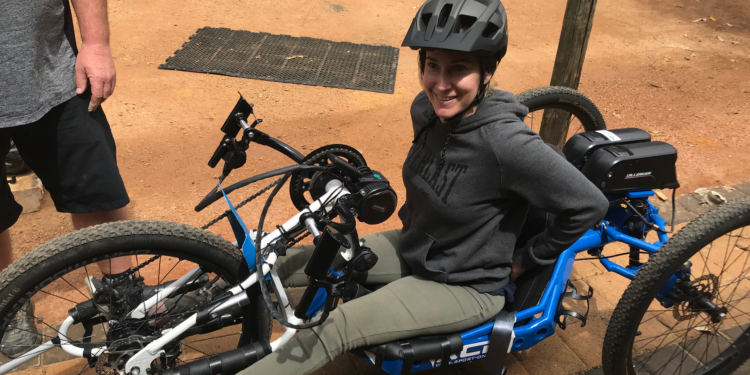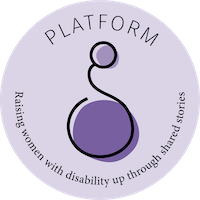Tell us about yourself
I’m a 33 year old, crazy as ever, spinal cord injury survivor living in Perth, Western Australia. I like to think of myself as a somewhat responsible adventure junky, but putting yourself out there doesn’t come without risk right?
What has been your journey of disability?
I’d managed to live the first 28 years of my life without breaking a bone until the day I broke a lot of them all at once, the most impactful in the long term being my back causing a Spinal Cord Injury (SCI). Before the injury I was super active, hardly ever home, riding my motorbike, camping, playing indoor beach volleyball and keeping up with family and friends. I was working in medical reception at the time but also as a freelance photographer in my spare time while studying a counselling course.
This particular morning, I hadn’t had breakfast and I was feeling rather light headed. At midday I was getting a pillion seat installed on my motorbike so I could strap a swag to it and start some crazy adventures. Instead of an hour ride home I decided I needed food first or if I still wasn’t feeling well I’d sleep it off at my friends place but I didn’t even make it to the pub. I only remember fragments of the accident so I can’t say for sure what happened (how convenient right? But trust me, I’ve had plenty of time to think). I was told I’d not turned a simple corner and went straight off a small bridge, landing on the opposite bank and rolling into water. It’s a very surreal experience not feeling your legs and being told you never will again.
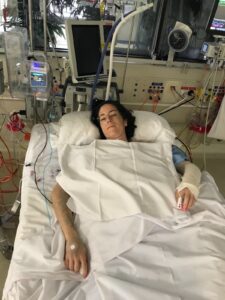
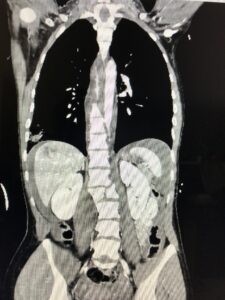
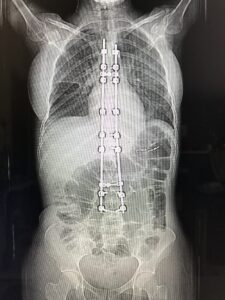
“It’s a very surreal experience not feeling your legs and being told you never will again.”
I’m paralysed from my waist down but really, I was lucky to survive at all and came close to dying on a few occasions due to internal bleeding and other traumatic injuries.
I suddenly found myself in a new world of disability having not really being exposed much to it or having any in depth understanding of what’s involved, I had to break through my own misconceptions along with untangling others and the wider communities misconceptions.
It’s such a big journey of self acceptance that never ends, I suppose it’s the same concept but in a different way for everyone, no matter how able bodied you are. I felt like I only had two choices though; when you’re at your worst, any step is growth and it was either keep moving with what I had, or give up. In some ways it feels like having two lives, pre and post injury. I had to start again, learn to sit up, dress myself, go to the toilet, shower but also grieve my able bodied future, grapple with my identity and find a way back to a new quality of life.
I also felt and still feel the difference between how I was seen before and how I am seen in a wheelchair. Most of the time people are actually beautiful and no matter what they’re going through, their intention is to help. Occasionally there are these massive hurdles called peoples inability to see passed themselves and it manifests in numerous and creative ways. A sense of humour and some comic relief are welcome and a ‘must have’ antidote to meet the heaviness and at times, ridiculous nature of what I deal with. I have come so far in building an independent life I never thought I’d have.
I think that’s largely to do with my attitude and I certainly didn’t get here on my own. I have these goals and ideas which are often met with an “Oh god”, “What now?” or “Of course you did” by my friends. Nevertheless, disability isn’t going to mean it’s not going to happen, it’s a part of me and it’s coming along whether I like it or not, so these goals are just going to take a bit longer to reach.
“When you’re at your worst, any step is growth”
What do you do with yourself?
At the time of writing this, I just started my first job since my accident only a couple of months ago at PBF (Paraplegic Benefit Fund). They’re a membership based not-for-profit organisation whose goal is easing the impact of Spinal Cord Injury (SCI) so I feel like I’ve landed in the perfect place to put my lived experience to use. Before the injury I had work experience in admin, reception, bookkeeping & photography so my role at PBF can be quite flexible and dynamic.
I still try to do some photo shoots on the side to discover and test my limits, and I’ve got myself a drone to keep my photography passion alive. I figured you don’t need working legs for that and I’ve been absolutely loving the creative outlet. I’m also involved with BTB (Break The Boundary) which is an adaptive mountain biking charity, where I can access nature in a new way.
On top of all this I love to travel, camp, see live music events, mountain bike and basically try everything I possibly can to see if I can still do it or still enjoy it in my new way. Above all though, the most important thing to me is connecting with the people I love because at the end of the day, your experiences and memories with people are the things that last beyond everything physical.
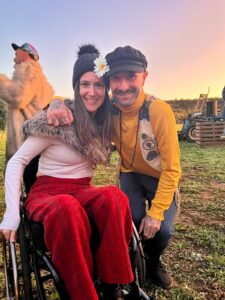
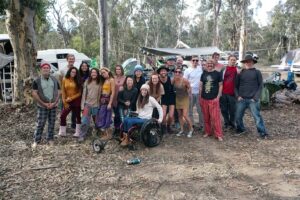
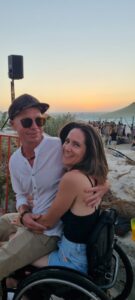
Are there things about you that people misunderstand because of your disability?
People are still people, whether you’re in a wheelchair or not. My personality and my core values haven’t completely changed (humbled for sure) but there are some things no one and no thing can take away from you, it’s your choice.
What I find people misunderstand about me, is perhaps thinking I’m mentally disabled when they see the wheelchair or just not knowing what to do at all when seeing a person in wheelchair in general. I would argue this has to do with not wanting to say or do something that would be perceived as offensive I get it, some people don’t want to talk about their experience or don’t want or need help and some don’t mind.
If you are in doubt, I suggest lead with kindness, empathy and honesty and if/when you ask questions, listen and respect the answer. I’m more than happy and open to talk about anything people want to know because to me, every person I talk to that has a positive experience is one step further to a world that is more aware, understanding and accepting. That kind of exposure is what’s going to hopefully change minds and encourage people to build a more accessible future.
“People are still people, whether you’re in a wheelchair or not. My personality and my core values haven’t completely changed”
Accessibility is another big issue that is surprisingly misunderstood because it’s so obvious and visible. I think visibility might be part of the problem because it’s often easier to stay home than deal with or speak up for what you want. Even then it’s a massive fight in some instances and a balancing act to educate people in a non-confrontational manner that ‘wheelies’ come in peace. I challenge you to think of a world without stairs, just kidding, that’s my little dream!
I can’t speak for everyone of course, only to my personal experience but we’re just trying to live our lives and really, accessibility is easier for everyone, it just makes a significantly enormous difference for people living with disabilities. Again everyone’s journey is so unique even if, in the SCI world, we have a similar level of injury. We’re still human and affected by cultural constructs surrounding things like age, gender, physical ability, emotion, sexuality, health, opportunity, social contexts and family & friends. No two wheelies manage themselves in the same way, just like no two people manage themselves in exactly the same way.
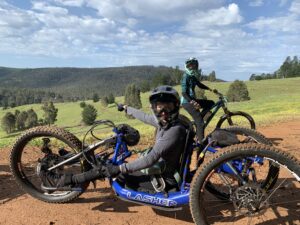
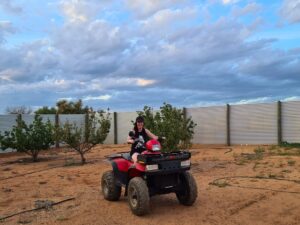
“we’re just trying to live our lives and really, accessibility is easier for everyone, it just makes a significantly enormous difference for people living with disabilities“
What do find is the biggest challenge you have experienced since sustaining your injury?
Well, that would be a decent tie between isolation and continence. When I first went home from hospital, I lived alone, no family members stayed with me, I had no partner or kids or even pets. I didn’t see anyone else in similar situations daily, I didn’t have access to a nurse button in emergencies, it’s hard to organise catch ups with people you’ve met in hospital because they’re also going through their own struggles, it was essentially an entirely new rehab process where I had to largely figure out what worked best for my situation on my own. No matter how positive of a person you are, there is no denying the grief that goes along with finding your life and yourself changed. Grief in general on any scale has an element of loneliness, so combined with the now physical isolation, it can compound, especially if you were quite active.
I found the two to three year mark was when I had settled somewhat into what I was capable of but I’ve also found there seems to be stages to the injury alongside the ‘typical’ stages of life. So the isolation tends to pop up in different ways as time goes on. Which is why having support and connections to other wheelies further along and/or going through a similar stage is so important for mental health. Continence is it’s own enormous ever-changing hurdle. Just when you think you have it under control, a new wave of unforeseen events presents itself and when you can’t feel or control your bowel/bladder function, it turns into a trial by error that usually lasts months to pinpoint what the real issue is.
I practically didn’t leave the house for the better part of a year because I was struggling to cope with bowel/ bladder issues. The main problem with being incontinent, aside from dealing with the obvious physical accidents, is how entrenched in shame it is. Unless you’ve gone through it or you’re in the medical industry, no one talks about it openly, even though everyone, no matter how able bodied, experiences it. Bowel/bladder function is the very first thing to be affected by a SCI so managing it is a part of everyday life and not having it under control is extremely debilitating for anyone at any stage in life.
“Grief in general on any scale has an element of loneliness so combined with the now physical isolation, it can compound, especially if you were quite active pre injury.”
What is one thing, experience or person you have had that completely changed your life?
Wow, these are some big questions. I can’t possibly choose one thing, it’s impossible. and there are many things that have changed my life. These include completing a counselling course that really helped me cope post injury and deal with my own and others grief and loss. Even pre injury, that course was integral to shifting my focus and changing how I saw and interacted with life.
I went to stay at a place in Sydney called Sargood. It’s the first 5 star resort of it’s kind in catering specifically for people with SCI. It has accessibility included in everything, not just accommodation, but recreation and leisure activities. Sargood gave me a glimpse into what life could be like when access is catered for and allowed me to test what I was really capable of.
My best friend still lives around the corner from me and she’s been there through everything pre and post injury, like a calm to the chaos. She encourages me to be my wildest self and sees and supports me for who I am. When she is around, I feel safe and confident that everything will be ok. Regaining my independence through getting my license back. It took me perhaps longer than most but it takes as long as it takes right? That’s not to say it wasn’t a long process of confidence building and logistics to work through but it has been a pivotal stage in becoming as independent as possible and that kind of freedom is life changing and priceless.
My partner gave me more of a reason to want to be better. He rapidly sped up my independence in a home environment and supported me to ask for more and experience more in the community. Most importantly, he saw past my set of wheels, made me feel attractive and loved and helped me realise that beyond our connection, everything else can be worked out. The bonds I have nurtured with other wheelies that will last a lifetime. Some I met in hospital while we were going through the worst times of our lives and you don’t often come across those greetings of souls while all the distractions of life are stripped away. Others are further along the path and their wisdom and insights are just as life changing. Then there’s also all who have come before and paved the way in advocating for wheelies and afforded me the lifestyle I’m able to lead.
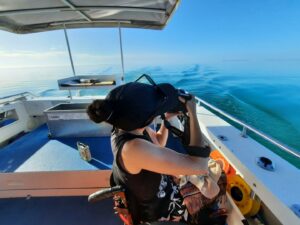
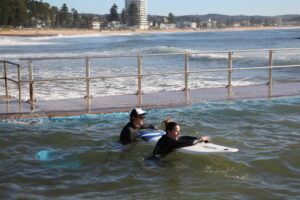
Is there a single piece of technology that makes your life easier? Why?
Having what I affectionately call ‘picky uppy sticks’ around the house have been a life saver. Then for outside the house, a Free Wheel attachment has allowed me to easily get over things like gravel, grass, rocks, gaps, ditches, curbs and all sorts of uneven terrain that two little caster wheels just can’t match. It’s given me confidence to go camping again and I always keep it in my car when I’m not using it. There are all sorts of tech that make my life easier (particularly if it involves a button to automate something) right down to our wheelchairs themselves, but I’m trying to keep this one short!
Knowing what you know now, what advice would you give your 18-year-old self?
Do as much as you can! Travel as much as you can! Dance as much as you can! Every part of life is experience, there are times you’re going to need to say no, but at the end of the day time itself is a privilege so try not to judge yourself for how you spend it. There is motivation in wanting to fit as much into life as you can but there is also peace in taking as much time as you need. Everything comes down to balance, self awareness is the tool you need to guide you and feeling is the key to life.
“There is motivation in wanting to fit as much into life as you can but there is also peace in taking as much time as you need”
Is there something that you would like people to know about you or about people with disability that they might not know?
Having a SCI and complete paralysis involves so much more than just navigating the world in a wheelchair. There are things people don’t see like constant nerve pain. Similar to phantom pain it’s like being cold to your bones and then getting into a really hot bath. It’s spasms affecting your balance, not having control of your bladder & bowel, overwhelming fatigue, atrophy, not being able to regulate your own temperature, being mindful that not feeling something doesn’t mean your body isn’t hurting and so much more that I can’t possibly list them all here.
I have no core control because I can’t feel or use my abdominal muscles which means I can’t actually sit up unassisted by my arms or without leaning or holding onto something. All these things take a toll, so I’d like you to imagine now how much extra effort is needed to complete everyday tasks or how it might affect you.
Try putting your pants on while sitting on them without moving your legs. Imagine changing the sheets and vacuuming with a pair of skates on. Try chopping up your veggies in a dining chair sitting sideways in your kitchen with your arms above your head. When you see someone out and about in a wheelchair, maybe quietly acknowledge to yourself how long and much it took to get there (even if they’ve been a wheelie for 20+ years) and perhaps think twice about parking in a wheelchair bay if you don’t need it.
I’m also pretty strong willed.
When it comes to putting my mind to achieving something that might be considered not possible for someone that’s paralysed, I’m prepared to do a lot to get there, take advantage of opportunities, break a few rules and team up with people that aren’t afraid to make it happen. One of my favourite guilty pleasures (considering not everyone has the same opportunity) is to be piggy backed or picked up because it far outweighs the effort it would’ve required for me to get there myself. It also makes me feel tall again and it usually means accessing places I can’t on my own which is incredibly exciting to me.
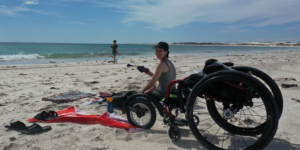
“I’m prepared to do a lot to get there, take advantage of opportunities, break a few rules and team up with people that aren’t afraid to make it happen.”
Best advice that you would like to share with other women with disabilities?
Everyone is fighting their own battles and doing the best they can. The world doesn’t owe anyone anything. Your feelings are your responsibility. Anger becomes bitter and toxic very quickly, find a way to release that shit that’s not detrimental to yourself or others. Vulnerability is not weakness. Accountability is not blame, it brings the power of choice back to you. Accept help. Reach out. Talk to people going through similar feelings.
Others reactions to you are more about where they’re willing to go within themselves. Focus on what gives you a feeling of freedom. Sex is an exploration of pleasure, an equal giving and receiving that’s deepened through connection and communication, not so much about some kind of end destination. A sense of humour is a must. What you’re going through is valid, don’t compare yourself to somebody else’s pain. Try to let go and not hold too tightly to who you were before. No one else fully knows how it feels to be you, it takes as long as it takes. Change is uncomfortable, use it as a sign of growth not a time to give up. TRY NEW THINGS, you might surprise yourself. You’re a survivor.
“TRY NEW THINGS, you might surprise yourself. You’re a survivor”

